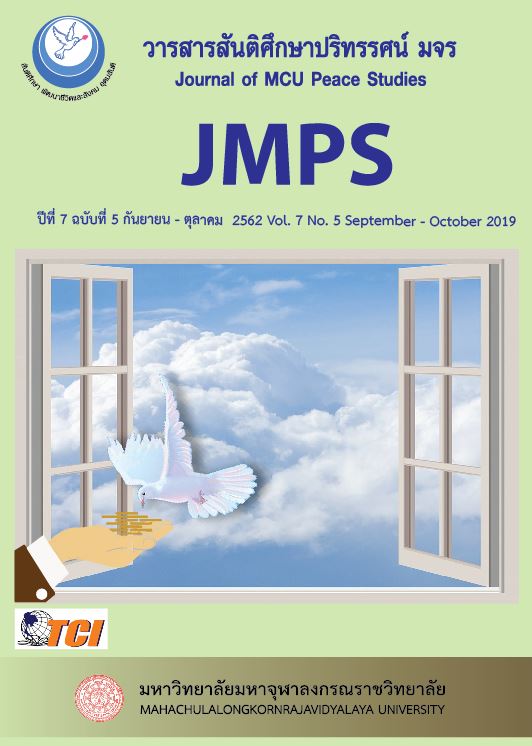การเมืองในนโยบายประชานิยมประเทศไทย พ.ศ. 2544-2557
Main Article Content
บทคัดย่อ
การวิจัยนี้มีวัตถุประสงค์ เพื่อศึกษานโยบายประชานิยมต่างประเทศ ศึกษาปัจจัยที่ก่อให้เกิดประชานิยมทางการเมืองใน พ.ศ. 2544 -2557 และศึกษาถึงการเมืองในการบริหารนโยบายประชานิยมของรัฐบาลในช่วง พ.ศ. 2544 -2557 โดยใช้กระบวนการวิจัยเชิงคุณภาพ ศึกษาเชิงนโยบายจากเอกสารวิชาการ และการสัมภาษณ์เชิงลึกจากกลุ่มตัวอย่าง ดังนี้ กลุ่มที่ 1 นักการเมือง ได้แก่ กลุ่มสนับสนุน กลุ่มต่อต้าน กลุ่มที่ 2 ข้าราชการเจ้าหน้าที่รัฐ กลุ่มที่ 3 นักวิชาการ พบว่า นโยบายประชานิยมต่างประเทศและประเทศไทยคล้ายกันในการให้ความสำคัญกับคนชนชั้นล่างด้วยนโยบายส่งเสริมคนจน และต่างกันที่ประเทศไทยมีความเข้มแข็งและมีวินัยทางการคลังมากกว่าต่างประเทศ นอกจากนี้ ปัจจัยที่ก่อให้เกิดประชานิยมทางการเมืองไทย พ.ศ. 2544-2557 ได้แก่ การเปลี่ยนแปลงโครงสร้างอำนาจของระบบการเมือง เป็นการลดบทบาทของฝ่ายทหาร การประกาศใช้รัฐธรรมนูญแห่งราชอาณาจักรไทย พ.ศ. 2540 เพื่อสร้างเสถียรภาพทางการเมืองโดยพัฒนาไปสู่ระบบสองพรรค รวมถึงสภาพเศรษฐกิจหลังวิกฤติเศรษฐกิจ พ.ศ. 2540 มีการใช้นโยบายประชานิยมเพื่อแก้ไขปัญหาความเหลื่อมล้ำทางสังคม ความยากจน และฟื้นฟูโครงสร้างพื้นฐานแก่ประชาชน ทั้งนี้ การเมืองในการบริหารนโยบายประชานิยมของรัฐบาลในช่วง พ.ศ. 2544-2557 พบว่า แต่ละรัฐบาลดำเนินนโยบายควบคู่กับการแสวงหาผลประโยชน์ ขาดจิตสำนึกรับผิดชอบ กระทั่งนำไปสู่ความแตกต่างของอุดมการณ์ทางการเมือง ดังนั้น ประเทศไทยควรเตรียมความพร้อมและสร้างความชัดเจนของนโยบายประชานิยมในมิติต่างๆ เพื่อกำหนดขอบเขตนโยบายประชานิยมที่เหมาะสมและมีประสิทธิภาพ
Article Details
ทัศนะและความคิดเห็นที่ปรากฏในบทความในวารสาร ถือเป็นความรับผิดชอบของผู้เขียนบทความนั้น และไม่ถือเป็นทัศนะและความรับผิดชอบของกองบรรณาธิการ ยินยอมว่าบทความเป็นลิขสิทธิ์ของวารสาร
เอกสารอ้างอิง
Acemoglu, D., Egorov, G., & Sonin, K. (2012). A political theory of populism. British: Oxford University Press.
Acemoglu, D., Egorov, G., & Sonin, K. (2013). A political theory of populism. Quarterly Journal of Economics, 771-805.
Angtrakul, R. (1991). The Project to Create a Rural Work with Thai Rural Development. Parliament Letter, 39 (July).
Bahr, D. (2017). How Sparta became. Spartan: Plutarch’s life of Lycurgus.
Coupal, Y. (2003). Macroeconomics of populism in Venezuela. Mimeo, Stanford University Press, Stanford.
Freeman, S. (2003). The Cambridge companion to Rawls. United States of America: Cambridge University Press.
Gyurkocza, D. (2011). Political theory of populism. South – East Europe.
Laothamatas, A. (2006). Thaksina-Popular: Meanings, Problems and Solutions. Bangkok: King Prajadhipok’s Institute.
Leeatham, P. (2015). The Reform of the Fiscal System and Government Budget to the Financial Discipline. .Journal of Economics, 19(1), 3-25.
MangKhalachon, N. (2010). News Agenda and Content Direction of Populist Policy as Presented in Newspaper During and Post Thaksin Shinawatra. Journal of Management Science Chiangrai Rajabhat University, 5(2), 64-96.
Mantasoot, P. (2015). Effectiveness of the Introduction of Civil Policy in Thai Rural Society. SSRU Graduate Studies Journal, 8(2), 298-308.
Muller, JWr. (2016). What is populism? Philadelphia. PA: University of Pennsylvania Press, Kindle edition.
Pipatseritham N. (2008). Factors Affecting the Occurrence of Popular Nations in Thailand. Thammasat Economic Journal, 26(3), 119-166.
Rawls, J. (1999). A theory of justice. Revised Edition. US: Harvard University Press.
Saengkaew, A. (2016). The Concept and the Increasing of Public Debt Through Populist Policies Utilization. Political Science and Public Administration Journal Khon Kaen University, 1(2), 99-103.
Sarovat, S. (2013). The Populist Policies Used in the 2011 General Election Campaign: A Case Study of the Democrat Party and Pheu Thai Party. Ph.D. Dissertation. Krirk University.
Siripongtugsin, N. (2018). Restorative Justice: Managing Conflicts to Empower the Justice of Pru Khuan Kreng Community in Nakhon Si Thammarat Province. Journal of Social Development, 20(1), 1-16.
Taggart, P. (2000). Populism. Buckingham. UK: Open University Press.
Techapeera, K. (2007). From Thaksin to coup 19 September 2549: Thailand’s Democratic Crisis. Bangkok: 14 October Foundation.
Weyland, K. (2001). Clarifying a contest concept: populism in the study of Latin American Politics. Comparative Politics.34 (1). International Relations Quarterly. V.2(1). (Spring 2011/1 Tavasz). Retrieved Jun 30, 2017, from https://www.forbes.com/sites/davidbahr1/2017/06/30/how-sparta-became-spartan-plutarchs-life-of-lycurgus/#56c9dfe62757.
Wonsurawattana, K. (2007). The United States Civil Movement. Quality of Life and Law Journal, 3(1), 5-21.


